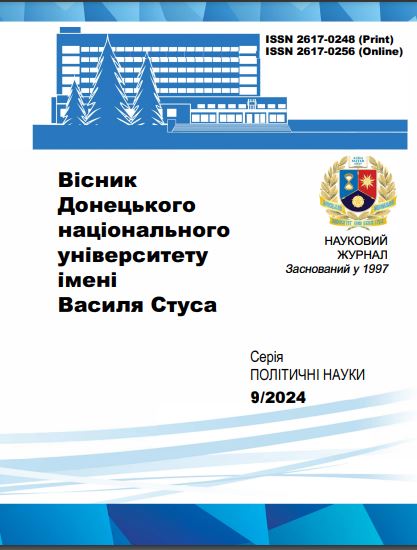Війна, бліцкриґ, мародерство і життя в обмін на техніку: російське вторгнення з точки зору теорії селекторату
DOI:
https://doi.org/10.31558/2617-0248.2024.9.2Ключові слова:
російське вторгнення, теорія селекторату, бліцкриґ, мародерство, автократіїАнотація
В статті обґрунтовується теорія селекторату як концепція, придатна для пояснення російського вторгнення в Україну. Це передбачало зведення низки поведінкових паттернів російського військово-політичного командування до типових дій авторитарного режиму. Розрахунок політичного керівництва РФ на військовий спосіб розв’язання міждержавних суперечностей та ризикований бліцкриґ як основний план бойових дій цілком укладається в логіку автократій. Вони мають схильність ухвалювати ризиковані й непродумані рішення насамперед тому, що лідерам режимів малої коаліції немає потреби звітувати перед своїми виборцями. Тому особисті наслідки поразки не такі погані для них, на відміну від демократичних режимів, критично залежних від думки громадян, через що демократичні режими намагаються ретельніше вибирати свої війни, роблячи наголос на зіткненнях із максимальними шансами на успіх. Нефаховість російської армії виявляється в численних – і часом дріб’язкових – фактах мародерства і грабування мирного населення. Автократії вже декілька тисячоліть виявляють схильність у леґітимний спосіб заохочувати своїх солдатів можливістю отримати «трофеї» такого штибу. Нарешті, шокуючі факти нехтування військовополітичного керівництва РФ здоров’ям і життям своїх солдатів, укоріненого навіть в організаційній структурі російської армії, відсилають до перверсивної шкали цінностей автократичних режимів. Її суть можна звести до такої дихотомії: наголос на першочерговій цінності озброєнь і техніки, які можна використати проти лідера і тим самим поставити під загрозу його виживання – і відсутність хоч якоїсь турботи про поновлювані, неорганізовані й тому не загрозливі людські життя власних солдатів. В її основі лежить слабкий зв’язок між населенням та утриманням влади з боку автократа, внаслідок чого немає політичного сенсу дбати про спорядження, здоров’я та життя найчисленнішої частини (російської) армії.
Посилання
Mesquita B. B. d., Smith A. Dictator’s Handbook: Why Bad Behavior Is Almost Always Good Politics. New York: PublicAffairs, 2011. 352 p.
Mesquita B. B. d., Smith A., Siverson R. M., Morrow J. D. The Logic of Political Survival. Cambridge: The MIT Press, 2003. 550 p. https://doi.org/10.7551/mitpress/4292.001.0001
Peceny M., Beer C. C., Sanchez-Terry S. Dictatorial Peace? The American Political Science Review. 2002. 96(1), Pp. 15–26. http://www.jstor.org/stable/3117807
Reiter D., Stam A. Democracies at War. Princeton: Princeton University Press, 2002. 304 p.
Reiter D., Stam A. Identifying the Culprit: Democracy, Dictatorship, and Dispute Initiation. American Political Science Review. 2003. 97(2), Pp. 333–337. doi:10.1017/S0003055403000704
Frye T. Weak Strongman. The Limits of Power in Putin’s Russia. Princeton/Oxford: Princeton University Press, 2021.
Treisman D. (ed.). The New Autocracy: Information, Politics, and Policy in Putin’s Russia. Washington: Brookings Institution Press, 2018. 336 p.
Ukraine: Freedom in the World 2022 Country Report | Freedom House. Freedom House. URL: https://freedomhouse.org/country/ukraine/freedom-world/2022 (date of access: 18.09.2024).
Russia: Freedom in the World 2022 Country Report | Freedom House. Freedom House. URL: https://freedomhouse.org/country/russia/freedom-world/2022 (date of access: 18.09.2024).
Democracy Index 2022 | Economist Intelligence Unit. Economist Intelligence Unit. URL: https://www.eiu.com/n/campaigns/democracy-index-2022/ (date of access: 18.09.2024).
Lai B., Slater D. Institutions of the Offensive: Domestic Sources of Dispute Initiation in Authoritarian Regimes, 1950–1992. American Journal of Political Science. 2006.Vol. 50, No. 1. Pp. 113–126. https://doi.org/10.1111/j.1540-5907.2006.00173.x
Croco S. E., Weeks J. L. War Outcomes and Leader Tenure. World Politics. 2016. 68(4), Pp.577–607. https://doi.org/10.1017/s0043887116000071
Connable B., Doll A., Demus A., et al. Russia’s Limit of Advance: Analysis of Russian Ground Force Deployment Capabilities and Limitations. https://www.rand.org/content/dam/rand/pubs/research_reports/RR2500/ RR2563/RAND_RR2563.pdf (date of access: 18.09.2024).
Clarkson A. Russia Couldn’t Occupy Ukraine if It Wanted to. Foreign Policy. URL: https://foreignpolicy.com/2022/02/03/russia-couldnt-occupy-ukraine-if-it-wanted-to/ (date of access: 18.09.2024).
Zabrodskyi M., Watling J., Danylyuk O. V., Reynolds N. Preliminary Lessons in Conventional Warfighting from Russia’s Invasion of Ukraine: February–July 2022. Royal United Services Institute for Defence and Security Studies, 2022. URL: https://www.rusi.org/explore-our-research/publications/special-resources/preliminarylessons-conventional-warfighting-russias-invasion-ukraine-february-july-2022 (date of access: 18.09.2024).
Frantz E., Ezrow N.M. The Politics of Dictatorship: Institutions and Outcomes in Authoritarian Regimes. Boulder: Lynne Rienner Publishers, 2011. 133p.
Watling J., Danylyuk O. V., Reynolds N. Preliminary Lessons from Russia’s Unconventional Operations During the Russo-Ukrainian War, February 2022–February 2023. Royal United Services Institute for Defence and Security Studies, 2023. URL: https://rusi.org/explore-our-research/publications/special-resources/preliminary-lessonsrussias-unconventional-operations-during-russo-ukrainian-war-february-2022 (date of access: 18.09.2024).
Gomza I. Putin’s Inevitable Invasion. Journal of Democracy. 2022. 33(3). Pp. 23–30.
Gel’man V. Why the Kremlin Invaded Ukraine – Riddle Russia. Riddle Russia. 2022, March 12. URL: https://ridl.io/en/why-the-kremlin-invaded-ukraine/?fbclid=IwAR3pTfh9R-exXh_AuLAwhqbW8ZZMLIsCgnEg0xz_JGE2Rwi1sfBujZ8e2M (date of access: 18.09.2024).
Gelpi C., Grieco J. M. Attracting Trouble. Journal of Conflict Resolution. 2001. 45(6). Рр. 794–817. https://doi.org/10.1177/0022002701045006005
Yaffa J. Inside the U.S. Effort to Arm Ukraine. The New Yorker. 2022, October 17. https://www.newyorker.com/magazine/2022/10/24/inside-the-us-effort-to-arm-ukraine (date of access: 18.09.2024).
Galeotti М. Putin’s Wars: From Chechnya to Ukraine. Oxford: Osprey Publishing, 2022. 401р.
The Battle of Hostomel Airport: A Key Moment in Russia’s Defeat in Kyiv – War on the Rocks. War on the Rocks. URL: https://warontherocks.com/2023/08/the-battle-of-hostomel-airport-a-key-moment-in-russias-defeat-in-kyiv/ (date of access: 18.09.2024).
Kendall-Taylor A., Frantz E. After Putin: Lessons from Autocratic Leadership Transitions. The Washington Quarterly. 2022. 45:1, Pp. 79–96.
Zelenskyy articulates the Russian dream: “To steal a toilet and die”. Ukrainska Pravda. URL: https://www.pravda.com.ua/eng/news/2022/04/22/7341485/
Schwirtz M., Troianovski A., Al-Hlou Y., Froliak M., Entous A., Gibbons-Neff T. Putin’s War: The Inside Story of a Catastrophe. The New York Times. 2022, December 17. https://www.nytimes.com/interactive/2022/12/16/world/europe/russia-putin-war-failures-ukraine.html?fbclid= IwAR1stdBhRgWbcmwNfT6c01JQLJcTfirWrmbyL52-pZSQfuR9X0yP6ytSp7U (date of access: 18.09.2024).
Berkowitz B., Galocha A. Analysis | Why the Russian military is bogged down by logistics in Ukraine. Washington Post. 2022, March 30. https://www.washingtonpost.com/world/2022/03/30/russia-military-logisticssupply-chain/?fbclid=IwAR2zaKhH2EnRbBPM2jMBEouWwYSGa9Q60reiCzD2W9riI-4kvJqBXeReMi0 (date of access: 18.09.2024).
Wrong M. I Didn’t Do It for You: How the World Betrayed a Small African Nation. London, New York: HarperCollins, 2005. 432 p.

